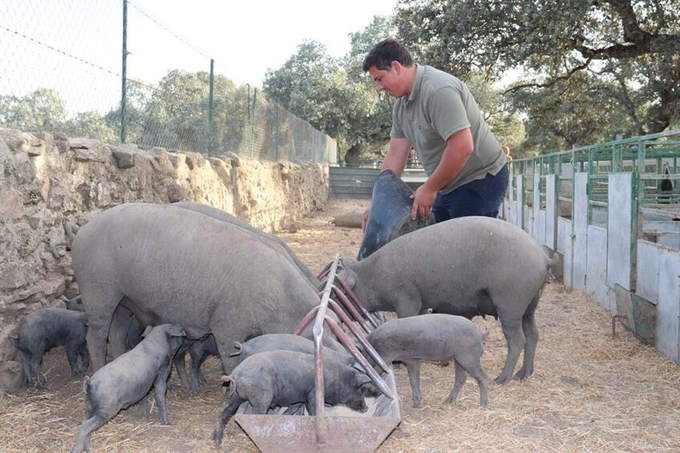June 14, 2025 | 18:37 GMT +7
June 14, 2025 | 18:37 GMT +7
Hotline: 0913.378.918
June 14, 2025 | 18:37 GMT +7
Hotline: 0913.378.918
Agricultural organisations have lobbied hard to get livestock farmers out of the regulations but the EP voted in large majority in favour of the revision of the so-called “Industrial Emission Directive” (IED).

Antonio Cano owns about 70 sows, and he’s finishing all piglets. The piglets are purebred Iberian pigs. - Photos: Rene Stevens
The new rules will make it mandatory to set the strictest achievable emission levels for the sectors covered. To combat water scarcity, environmental performance targets will become obligatory for water consumption. For waste, resource efficiency, energy efficiency and raw material use, targets will be within a range and for new techniques, they will be indicative.
The EP and the other legislators in the EU agreed to extend IED measures to pig farms with more than 350 livestock units (LSU), equivalent to some 1,100 adult pigs and 700 sows.
Farms are excluded if they are raising pigs in an extensive or organic manner, and outside for a significant amount of time in a year. The current directive from 2010 already was already covering pig farms with more than 2,000 pigs and 750 sows.
For poultry, the threshold remains unchanged at 280 LSU or 40,000 animals for rearing chickens for meat. For egg producers, the limit is lowered to 21,400 laying hens compared to 40,000 under the existing rules.
The EP decided earlier to leave cattle farms out of the new directive. However, the European Commission has to assess, by 31 December 2026, whether there is a need to further address the emissions from rearing livestock, including from cattle, and a reciprocity clause to ensure producers outside the EU meet requirements similar to EU rules when exporting to the EU.
Citizens in the whole of the EU can access data on all permits, including those from livestock farms, from a new EU Industrial Emissions Portal. Companies that do not comply can face penalties of at least 3% of the operator’s annual EU turnover for the most serious infringements. EU countries shall give citizens affected by non-compliance the right to claim compensation for damages to their health.
Bulgarian MEP Radan Kanev (on behalf of political party EPP), commented, “Today’s vote shows Parliament’s commitment to the zero pollution goals of the Green Deal and the health of Europeans. It also demonstrates that those goals can be achieved without placing an additional administrative burden on businesses and especially on European farmers. The vote emphasises that MEPs understand the reasons behind the farmers’ protests.”
The law now also has to be adopted by Council, before being published in the EU Official Journal and entering into force 20 days later. Member states will then have 22 months to comply with this directive.
The industrial emission directive is the main EU instrument regulating air, water and soil pollution from industrial installations including intensive livestock farms, which can lead to health problems such as asthma, bronchitis and cancer, the European Parliament further explains. It also regulates generation of waste, use of raw materials, energy efficiency, noise and prevention of accidents.
(PP)

(VAN) Extensive licensing requirements raise concerns about intellectual property theft.

(VAN) As of Friday, a salmonella outbreak linked to a California egg producer had sickened at least 79 people. Of the infected people, 21 hospitalizations were reported, U.S. health officials said.

(VAN) With the war ongoing, many Ukrainian farmers and rural farming families face limited access to their land due to mines and lack the financial resources to purchase needed agricultural inputs.

(VAN) Vikas Rambal has quietly built a $5 billion business empire in manufacturing, property and solar, and catapulted onto the Rich List.

(VAN) Available cropland now at less than five percent, according to latest geospatial assessment from FAO and UNOSAT.

(VAN) Alt Carbon has raised $12 million in a seed round as it plans to scale its carbon dioxide removal work in the South Asian nation.

(VAN) Attempts to bring down the price of the Japanese staple have had little effect amid a cost-of-living crisis.